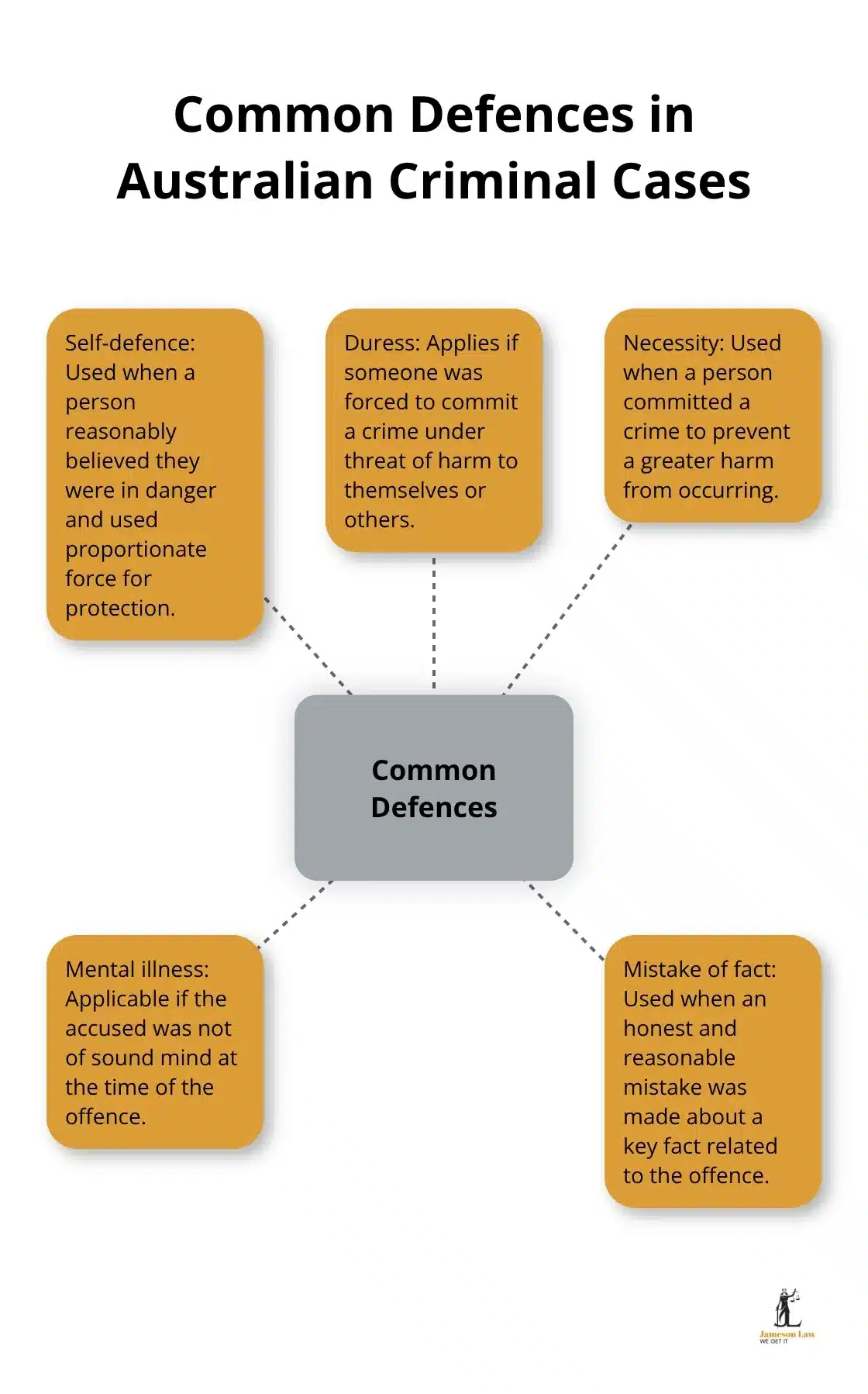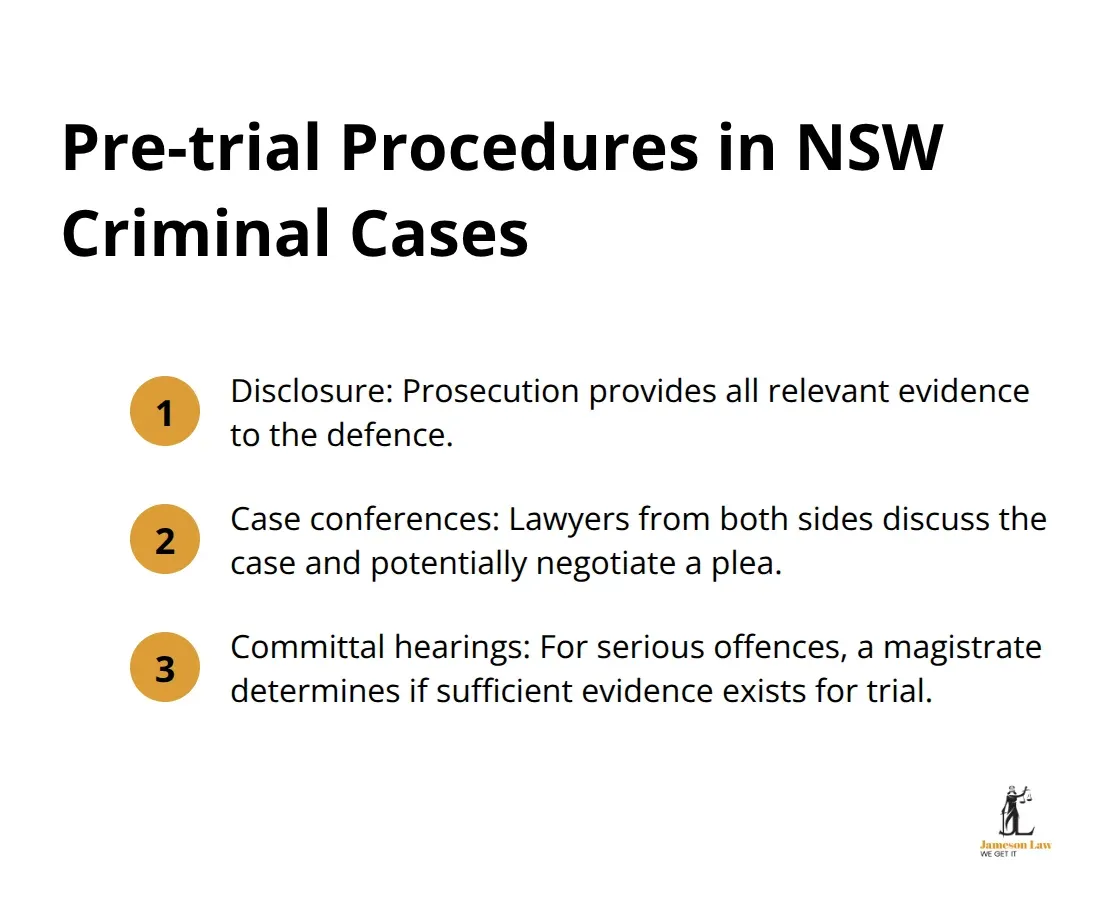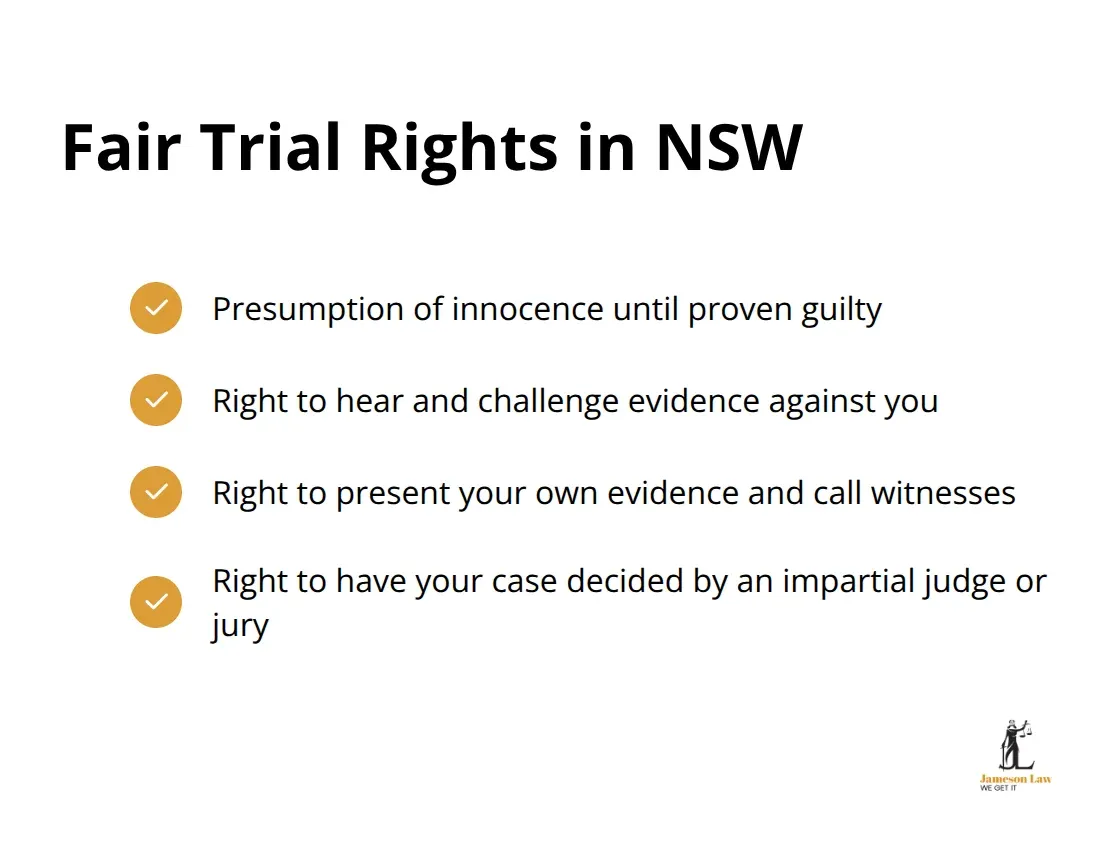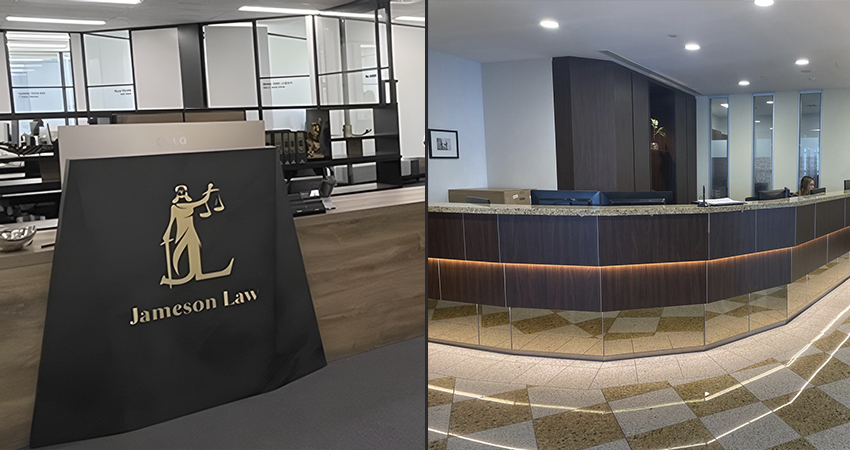Criminal law and procedure can be complex and intimidating for those unfamiliar with the legal system. At Jameson Law, we understand the importance of demystifying these concepts for our clients.
This guide breaks down the key elements of criminal law, outlines the criminal procedure in NSW, and explains the rights of the accused. Whether you’re facing charges or simply want to understand the legal landscape better, this beginner’s guide will provide valuable insights.
Key Elements of Criminal Law
Understanding the Foundation of Criminal Law in Australia
Criminal law forms the backbone of Australia’s justice system. It defines unacceptable behaviour and outlines consequences for breaking societal rules. The primary purpose of criminal law is to protect individuals and maintain social order.
Types of Crimes in the Australian Legal System
Australia categorises crimes differently from other countries. Instead of felonies and misdemeanours, we use a system of summary and indictable offences:
- Summary offences: Less serious crimes dealt with in Local Courts (e.g., minor assaults, traffic offences).
- Indictable offences: More serious crimes heard in higher courts (e.g., murder, large-scale drug trafficking).
Some offences can be either summary or indictable, depending on their severity. For instance, theft might be a summary offence for low-value items or an indictable offence for larger amounts.
The Two Key Elements of Crime: Mens Rea and Actus Reus
For a person to be found guilty of a crime in Australia, two key elements must typically be present:
- Mens rea (the guilty mind): This refers to the mental state of the accused at the time of the offence. Wrongful intent must have existed for most crimes to be proven.
- Actus reus (the guilty act): This is the physical act of committing the crime.
For example, in a theft case, taking someone else’s property constitutes the actus reus, while the intention to permanently deprive the owner of that property represents the mens rea.
Common Defences in Australian Criminal Cases
When facing criminal charges, several defences might apply:
- Self-defence: Used when a person reasonably believed they were in danger and used proportionate force for protection.
- Duress: Applies if someone was forced to commit a crime under threat of harm to themselves or others.
- Necessity: Used when a person committed a crime to prevent a greater harm from occurring.
- Mental illness: Applicable if the accused was not of sound mind at the time of the offence.
- Mistake of fact: Used when an honest and reasonable mistake was made about a key fact related to the offence.
The effectiveness of these defences can vary greatly depending on the specific circumstances of each case. Professional legal advice is essential for anyone facing criminal charges to navigate these complex legal concepts and build a strong defence strategy.

As we move forward to explore the criminal procedure in NSW, it’s important to understand how these key elements of criminal law come into play throughout the legal process.
How Criminal Procedure Works in NSW
Arrest and Charging Process
The criminal procedure in New South Wales (NSW) begins with an arrest. Police officers have the authority to arrest individuals suspected of committing a crime. Upon arrest, police must inform suspects of their rights, including the right to remain silent and the right to legal representation. Officers then transport the arrested individual to a police station for processing, which may involve interviews, fingerprinting, and DNA sample collection if necessary.
After processing, police decide whether to charge the individual. If charges are laid, the accused receives a Court Attendance Notice (CAN) that outlines the charges and specifies the court appearance date.
Bail Considerations and Hearings
The Bail Act 2013 governs bail decisions in NSW. Police can grant bail at the station, or if refused, the accused must appear before a court for a bail hearing. Courts consider several factors when deciding on bail:
- Offence seriousness
- Prosecution case strength
- Community ties
- Previous court appearance record
Bail conditions may include regular police reporting or passport surrender.
Pre-trial Procedures and Plea Bargaining
Before a trial, several pre-trial procedures occur:
- Disclosure: Prosecution provides all relevant evidence to the defence.
- Case conferences: Lawyers from both sides discuss the case and potentially negotiate a plea.
- Committal hearings: For serious offences, a magistrate determines if sufficient evidence exists for trial.
Plea bargaining often occurs during this stage. The accused may plead guilty to a lesser charge in exchange for a more lenient sentence. However, the judge makes the final decision on accepting plea deals.

Trial Process and Jury Selection
The trial process differs based on the court hearing the case. Local Courts handle summary offences and some indictable offences, with a magistrate hearing the case without a jury. More serious indictable offences go to higher courts (District or Supreme Court), typically involving a jury.
Jury selection in NSW involves random selection from the electoral roll. Both prosecution and defence can challenge a certain number of jurors without providing reasons.
During the trial, both sides present their case, call witnesses, and make closing arguments. The jury (or magistrate in Local Court matters) then decides on the verdict.
Sentencing and Appeals
If found guilty, the offender faces sentencing. The Crimes (Sentencing Procedure) Act 1999 guides sentencing in NSW. Factors considered include offence nature, offender’s background, and mitigating circumstances.
Sentences range from fines and good behaviour bonds to imprisonment.
After sentencing, both prosecution and defence can appeal against the conviction, sentence, or both. The NSW Court of Criminal Appeal hears most criminal appeals from District and Supreme Courts.
Understanding these complex procedures requires expert legal guidance. As we move to discuss the rights of the accused in NSW, it becomes clear how these procedural elements interplay with the protections afforded to individuals within the criminal justice system.
Rights of the Accused in NSW
Legal Representation: Your First Line of Defence
In New South Wales, individuals accused of crimes have the right to legal representation. You can hire a lawyer or apply for legal aid if you can’t afford one. Legal Aid ACT provides representation in criminal law, family law, and case and protection matters through their Litigation Practice.
We at Jameson Law recommend seeking legal counsel immediately after being accused or arrested. A lawyer can guide you through police questioning, explain the charges against you, and start building your defence strategy right away.
The Power of Silence: Protection During Questioning
The right to silence is a fundamental protection in NSW criminal law. You don’t have to answer police questions beyond providing your name and address. The right to silence still exists under NSW law, and silence may not be taken as evidence of guilt where it is the only evidence of guilt.
However, certain situations (such as traffic offences) may require you to provide additional information. It’s important to understand when you must speak and when you can remain silent. A criminal defence lawyer can provide specific guidance based on your situation.
Fair Trial Rights: Beyond the Courtroom
Your right to a fair trial in NSW includes:
- Presumption of innocence until proven guilty
- Right to hear and challenge evidence against you
- Right to present your own evidence and call witnesses
- Right to have your case decided by an impartial judge or jury
Prosecutors must prove your guilt beyond reasonable doubt and disclose all relevant evidence to your defence team before the trial.

The NSW Sentencing Council undertook projects and provided an overview of notable sentencing research in the 2020 calendar year.
Protection Against Double Jeopardy
The principle of double jeopardy protects you from being tried twice for the same offence. If you’re acquitted of a crime, the prosecution can’t appeal the verdict or charge you again for the same offence.
However, NSW has some exceptions to this rule. For very serious offences (such as murder or gang-related crimes), a re-trial may be ordered if compelling new evidence emerges. These exceptions are rare and subject to strict legal scrutiny.
Rights During Police Questioning and Searches
During police questioning and searches, you have specific rights:
- The right to know why you’re being questioned or searched
- The right to have a support person present during questioning (if you’re under 18 or have a cognitive impairment)
- The right to an interpreter if English isn’t your first language
- The right to refuse a strip search in public places (unless it’s urgent and necessary)
Understanding these rights is essential for protecting yourself during interactions with law enforcement. If you’re unsure about your rights during questioning or searches, it’s best to consult with a legal professional.
Final Thoughts
Knowledge of criminal law and procedure empowers individuals to protect their rights and make informed decisions. The legal process, from arrest to sentencing, highlights the need for professional guidance. Those facing criminal charges in NSW should act quickly: remain silent, request legal representation, and gather relevant case information.
We at Jameson Law specialise in criminal law matters. Our experienced lawyers guide clients through every step of the criminal justice process. We understand NSW criminal law and procedure nuances and use this knowledge to advocate for our clients’ rights and interests.
A criminal charge doesn’t define you, but your response can impact your future. Seek professional legal advice and actively engage in your defence to navigate the criminal justice system confidently. Having a knowledgeable legal team can make a significant difference in achieving the best possible outcome for your case.













